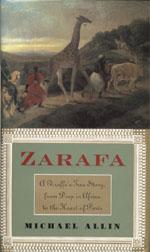 Zarafa: A
Giraffe’s True Story, from Deep in Africa to the Heart of
Paris Zarafa: A
Giraffe’s True Story, from Deep in Africa to the Heart of
ParisBy Michael Allin Walker and Company, 1998. 215 pages. $22 U.S. Reviewed by Arthur Charity (Ottawa Citizen, February 1999)
Alfred
Hitchcock used to call it a McGuffin - the mysterious briefcase, the
stolen money or the code words (“Thirty-nine steps”) that everyone
in a story is ostensibly concerned about, but that’s really nothing
more than the storyteller’s excuse for the parade of eclectic
pleasures to come. In Michael Allin’s book Zarafa it is a
giraffe. Specifically, a giraffe given by the expansionist pasha of
Egypt, Muhammad Ali, to the king of France in 1827 to secure his
neutrality during the Turks’ invasion of Greece. As a tool of
diplomacy, the giraffe failed. As an immigrant to France, she did
rather better than most Africans are doing today, being welcomed
into Parisian society and creating a momentary stir in fashion. As
the stuff of history, well: She left so little mark that her entire
known story can be told in well under half of this already thin
book.
But what of it? As a writer, Allin wears the word “tangential” as
a mark of pride. At what reasonable people could argue is much, much
less than the drop of a hat, he strays off (for example) into an
account of the mock naval battle the people of Marseilles staged for
King Francis I in 1516, in which the ships lobbed oranges at one
another instead of fire. (Lucky thing, too, as the king was
“wounded” several times.) And the history of the Mamelukes,
ex-slaves who formed an Islamic homosexual military society that was
reputed to contain the fiercest warriors, with the best artistic
taste, in all the world. And the Roman emperor Heliogabalus’s
peculiar sense of humor. (He would put guests who had passed out
drunk at his parties into locked rooms with lions, leopards or
bears, then wait for the hilarity when they woke up and realized
where they were.) And the career of Octave Joseph Anthelme Sèves,
hired by Ali to train raw Egyptian conscripts, and so hated by his
troops that during rifle practice they shot at him; when they
were finally able to kill his horse, he took it with pride, as a
mark of improvement. They all form part of Zarafa’s story in
the same way that, say, Amelia Earhart forms part of Nelson
Mandela’s.
Eventually, after sailing down the Nile, crossing the
Mediterranean, and walking amid crowds and pageantry from Marseilles
to the capital, Muhammad Ali’s giraffe became a fixture of the Paris
municipal zoo, in the now charmingly decrepit Jardin des Plantes -
and in this slender detail, believe it or not, lies the whole reason
for this book’s existence. You see, as a child Michael Allin read a
James Dickey poem about the Jardin and fell in love with the name.
Children are very wise in never rejecting or even questioning an
obsession; why close off any reason to be excited about life? In
college he used to scour book indexes for references to the Jardin;
it became his excuse for tracing out a whole spreading web of
curiosity, which led in turn to other names and stories (like this
one) and their own webs of curiosities. The bits and pieces in
Zarafa don’t really add up to much, but there’s a rare joy in
spending 200 pages with a man like this, who’s never lost the gift
of being fascinated by everything.
|
| p r e v i o u s p a g e |  |
n e x t p a g e |
